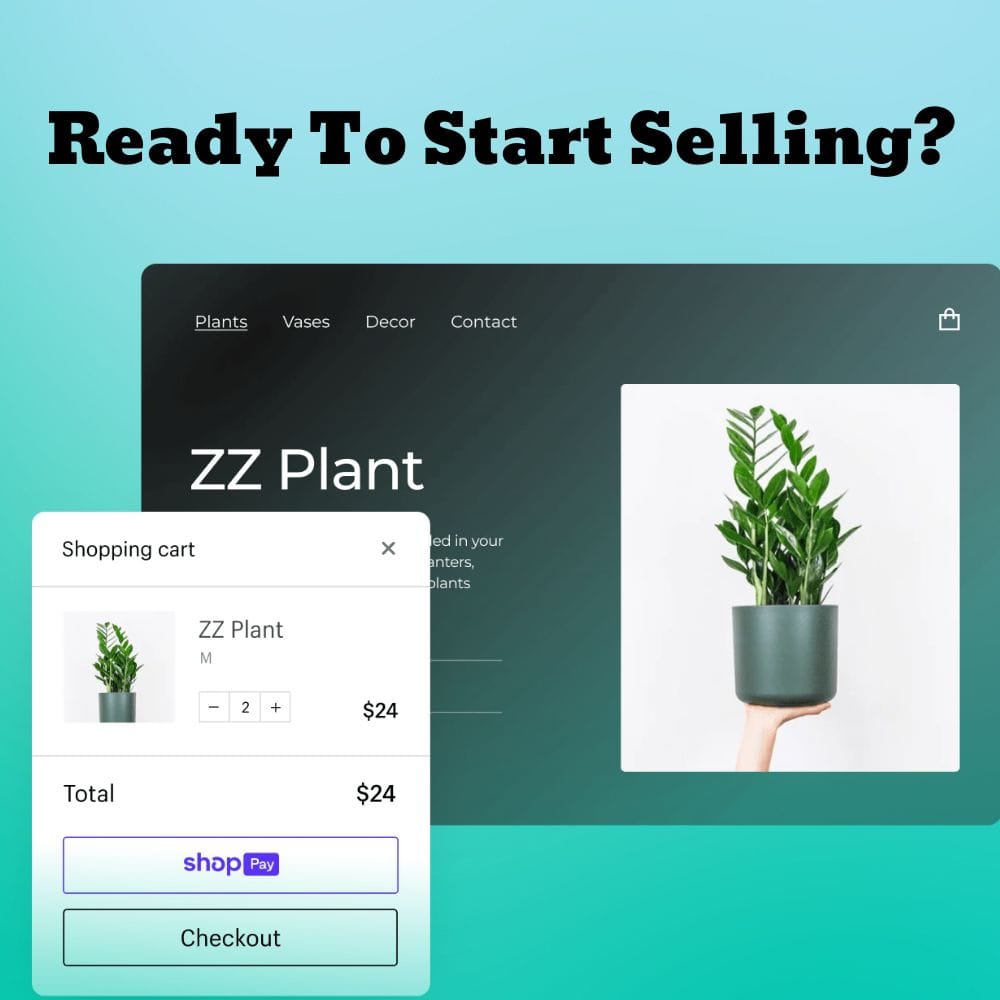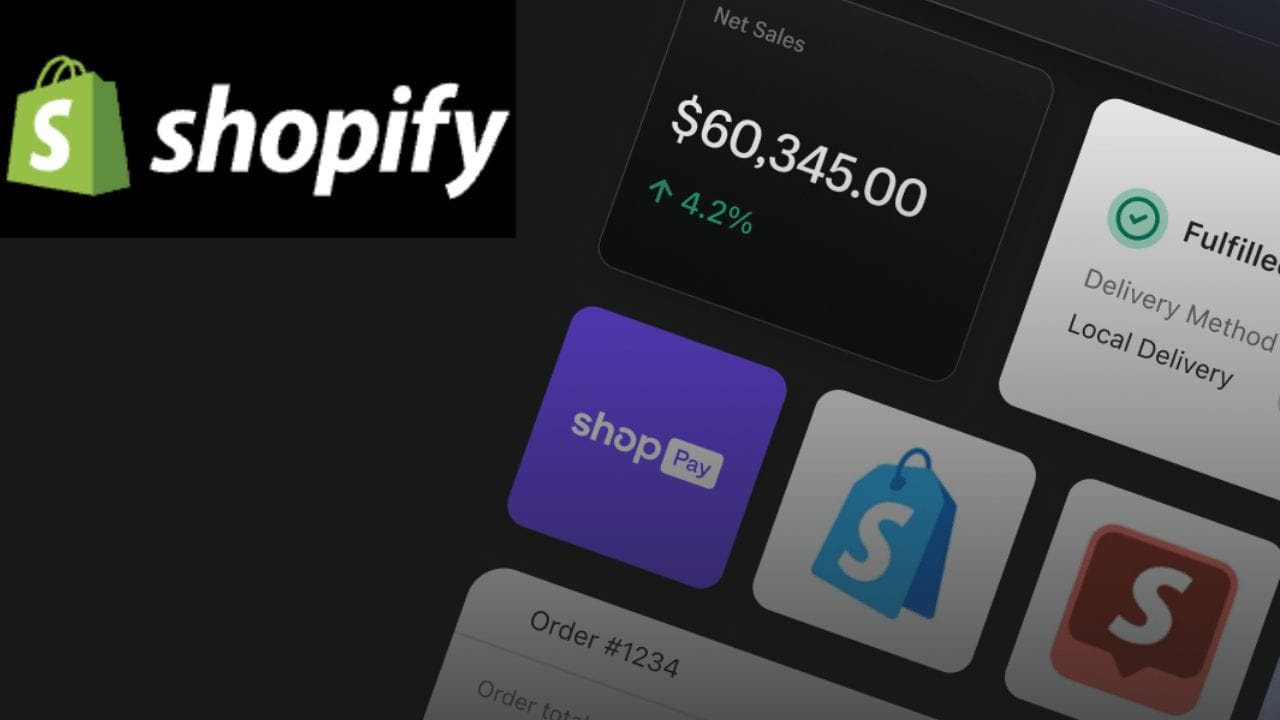Key Takeaways:
- Shopify Simplifies Online Selling: Discover how Shopify provides a user-friendly platform that supports both novices and seasoned merchants in building and managing an online store.
- Versatile Features and Tools: Explore the diverse range of tools and features Shopify offers, from inventory management to marketing solutions.
- Flexible Pricing Plans: Learn about Shopify’s various pricing plans that cater to different business sizes and needs, ensuring there's something for everyone.
What Exactly Does Shopify Do?
Shopify is a comprehensive e-commerce platform that allows individuals and businesses to create their own online stores. It offers a wide array of tools and services designed to support the sale of products and services online. Whether you're a budding entrepreneur or an established business, Shopify provides a solid foundation to support your online sales ambitions.
How We Choose
Our team has spent hours researching through thousands of user reviews and star ratings for the best software products on the market. We take into account factors such as performance, user experience, technical benchmarks, and affordability when recommending products to enhance our reader's digital lives. We strive to find the best options that meet everyone’s needs - even those on a budget!
We hope you find your next special item below! This software product was independently selected by our editors. Good Guru Reviews may collect a share of sales or other compensation from the links on this page if you decide to buy something (at no additional cost to you, that's how we stay in business). Enjoy finding your next special item with us!
The Heart of Shopify: E-commerce Made Easy
At its core, Shopify serves as an online store builder. This platform eliminates the technical barriers associated with setting up an e-commerce website. Users can choose from a variety of customizable templates or even create their own website design. This flexibility makes Shopify an attractive option for those who wish to reflect their brand’s personality through their online storefront.
Comprehensive Dashboard: Your Business Command Center
The Shopify dashboard is a powerful tool for managing an online business. It allows Shopify store owners to oversee their e-commerce business efficiently. From this central hub, you can track orders, manage inventory, and view analytics to understand customer behavior and business performance. This integrated approach ensures that store owners have a firm grip on the pulse of their business operations.

Shopify’s Multifaceted E-commerce Solutions
Shopify Plans: Tailored to Fit Every Business Size
Shopify offers several plans, including Shopify Lite, Basic Shopify, Shopify, Advanced Shopify, and Shopify Plus. These plans are designed to cater to businesses at different stages of growth, from small startups to large enterprises. Each plan varies in terms of the features and support provided, allowing businesses to scale their operations on Shopify as they grow.
Multiple Sales Channels: Expanding Your Reach
One of Shopify’s standout features is its ability to integrate with multiple sales channels. This means that Shopify merchants can sell not only through their own websites but also across different online marketplaces and social media platforms. This multi-channel selling approach helps businesses reach a wider audience and boost sales.
Specialized Features for Enhanced Performance
Shopify App Store: Extending Functionality
The Shopify App Store is a treasure trove of applications that can extend the functionality of your e-commerce store. Whether you need advanced analytics, improved inventory management, or marketing automation, there’s likely an app for that. Shopify apps are designed to integrate seamlessly with your store, enhancing its capabilities and helping you meet specific business needs.
Shopify Payments: Streamlined Transaction Processing
Shopify Payments, Shopify’s payment processor, simplifies the way store owners accept payments. It eliminates the need for third-party payment gateways, reducing transaction fees and streamlining the payment process. This not only enhances the customer experience but also simplifies the financial operations for the seller.

Marketing and SEO: Driving E-commerce Sales
Shopify for Beginners: Is It the Right Choice?
Starting an e-commerce business can be like navigating a labyrinth, but Shopify simplifies this journey, especially for novices. For those pondering over the question, "Is Shopify good for beginners?" the answer leans heavily towards a resounding yes. The platform offers a user-friendly interface that makes setting up your own online store a breeze. From selecting a theme from the Shopify theme store to populating your store with products, the process is designed with simplicity in mind. Additionally, the basic Shopify plan is economically priced, making it accessible for individuals just dipping their toes into the world of online selling.
Moreover, Shopify provides an extensive array of online resources and online courses tailored specifically for beginners. These educational tools help new merchants grasp the essentials of using the Shopify admin effectively and making the most of Shopify e-commerce tools. The free trial period is a cherry on top, allowing potential sellers to test the waters without any financial commitment. This trial is a practical way to explore various features and decide whether Shopify aligns with their business needs before fully committing to a Shopify subscription.
Shopify's Impact on Global E-commerce Trends
Shopify has not just redefined the way entrepreneurs sell products online; it has actively shaped global e-commerce trends. As an e-commerce platform, Shopify empowers online sellers with tools that streamline the entire sales process, from inventory management to customer checkout. This has significantly lowered the barrier to entry into the e-commerce business, allowing even novices to compete on a global stage. The platform's intuitive design and extensive support network make it an attractive option for anyone looking to start an e-commerce website.
Moreover, Shopify's influence extends beyond individual stores. By providing a robust infrastructure, Shopify supports the surge of online shopping, influencing retail trends and consumer behaviors worldwide. The platform's analytics tools help sellers understand market demands and adapt quickly, making Shopify stores not just participants but leaders in the e-commerce revolution. This adaptability is crucial in a rapidly evolving market, where staying ahead of trends can mean the difference between flourishing and floundering.

Shopify Starter: Launching Your E-commerce Journey
Shopify Starter is a beacon for newcomers venturing into the e-commerce landscape. This entry-level plan is a cost-effective gateway, offering essential tools that empower entrepreneurs to set sail smoothly in the competitive e-commerce sea. With Shopify Starter, users can effortlessly create compelling online stores, integrate with social media platforms, and start selling without the need for a full-fledged website. This plan is ideal for small-scale businesses or individuals testing the waters of e-commerce, providing a robust foundation without overwhelming the user with complexity.
The beauty of Shopify Starter lies in its simplicity and effectiveness. It strips down the often overwhelming aspects of setting up an e-commerce business, allowing users to focus on refining their product offerings and marketing strategies. For those who are dipping their toes into e-commerce for the first time, Shopify Starter acts as a gentle guide, offering straightforward tools and resources that are easy to understand and implement. This approach not only demystifies the initial setup process but also accelerates the journey from concept to market.
Shopify's Role in Omnichannel Strategy
Shopify isn't just a standalone e-commerce platform; it's a pivotal tool in the omnichannel approach that blends online and physical sales environments. For businesses transitioning from a brick-and-mortar store to the digital landscape, Shopify facilitates a seamless integration. This capability ensures that inventory and sales data flow smoothly between offline and online channels, providing a unified customer experience. Retailers can track customer interactions across different platforms, making it easier to tailor marketing strategies and improve sales outcomes.
Moreover, Shopify's robust features support businesses in creating a cohesive shopping experience. Whether a customer visits the online store or the physical location, the service quality remains consistent. Shopify's tools help in maintaining inventory synchronization, which is crucial for real-time stock updates and avoiding sales discrepancies. This integration empowers businesses to serve their customers efficiently, ensuring that no matter where the customer makes a purchase, the experience is hassle-free and enjoyable.

Shopify's Scalability: Growing with Your E-commerce Business
Shopify isn't just a starting block for new e-commerce ventures; it's a growth engine for scaling operations. Whether you're expanding from a small online store to a global e-commerce platform, Shopify's infrastructure supports growth without skipping a beat. The platform offers various plans that accommodate increasing product inventories and traffic volumes, ensuring that as your business grows, your technical foundation is solid and scalable.
Moreover, Shopify's advanced analytics tools help you keep a finger on the pulse of your expanding business. By analyzing customer data and shopping trends, you can make informed decisions that propel your business forward. This data-driven approach is crucial for scaling in the competitive e-commerce landscape, making Shopify an invaluable partner in your business growth journey.
Shopify's Customization Capabilities: Tailoring Your Online Store
Shopify stands out as a versatile e-commerce platform that caters to the unique needs of every e-commerce business. Whether you're sprucing up an existing online shop or starting from scratch, Shopify's extensive theme library and customizable settings allow for a personal touch without needing extensive coding knowledge. This flexibility ensures that each Shopify online store can be as unique as the products it sells, providing a tailored shopping experience that reflects the brand's personality and meets customer expectations.
Moreover, the platform's advanced customization tools empower merchants to implement changes quickly and efficiently. From adjusting color schemes and fonts to adding unique features through apps, Shopify works seamlessly to ensure that every storefront meets the specific demands of its target audience. This capability not only enhances user engagement but also strengthens brand identity, making Shopify a go-to choice for businesses aiming to stand out in the crowded digital marketplace.
Shopify's Adaptability: Meeting the Needs of Diverse Markets
Shopify isn't just a one-size-fits-all solution; it's a chameleon in the e-commerce landscape. For businesses that span across various sectors—from fashion to electronics—Shopify molds itself to meet specific industry demands. This adaptability ensures that whether you're a budding entrepreneur or a seasoned business mogul, your Shopify online store can be customized to reflect the unique aspects of your market. The platform's versatility is evident in its wide array of themes and specialized apps, which empower businesses to tailor their online presence and operational strategies effectively.
Moreover, Shopify's global reach enhances its adaptability. By supporting multiple currencies and languages, this e-commerce platform breaks geographical and linguistic barriers, making it an excellent choice for businesses aiming to expand internationally. This feature not only simplifies the shopping experience for international customers but also helps store owners increase their market penetration. Shopify's comprehensive approach in adapting to diverse markets makes it a formidable tool for any e-commerce business looking to thrive on a global scale.
Shopify FAQ: Answering Common Queries
Navigating the waters of e-commerce can be overwhelming, especially for newcomers. Recognizing this, Shopify offers an extensive FAQ section that acts as a first aid kit for e-commerce entrepreneurs. This resource is packed with answers to common queries about how Shopify works, from setting up an online store to understanding the nuances of payment gateways. It's an invaluable tool for users seeking quick answers and effective solutions, ensuring they spend less time troubleshooting and more time growing their business.
In addition to the basics, the Shopify FAQ section delves into more complex issues, offering insights into advanced features and integration capabilities. Whether you're curious about SEO strategies, need help with a Shopify app, or want to explore advanced analytics, the FAQ has you covered. This proactive approach in addressing user concerns not only enhances user satisfaction but also empowers store owners to make informed decisions, thereby optimizing their e-commerce platform for peak performance.
Integrating Shopify with Your Brick and Mortar Store: A Holistic Approach
For retailers who juggle both an online and a brick-and-mortar store, Shopify offers streamlined solutions to harmonize sales channels. By using Shopify's POS (Point of Sale) system, businesses can manage their inventory across both platforms in real time, ensuring consistency and reducing the risk of overselling or stock discrepancies. This integration facilitates a cohesive shopping experience for customers, whether they shop online or in-store, enhancing overall satisfaction and loyalty.
Additionally, the synchronization between Shopify's e-commerce platform and physical stores extends to customer data management. Retailers can track customer preferences and behaviors across both channels, gaining valuable insights that can drive personalized marketing strategies and improve service delivery. This dual-channel approach not only optimizes operational efficiency but also boosts sales by leveraging the strengths of each sales avenue, making Shopify an indispensable tool for modern retailers.
Integrating Shopify work with Brick-and-Mortar Stores: A Seamless Retail Solution
For businesses that straddle the digital and physical retail spaces, Shopify offers seamless integration solutions. This dual presence is often a complex challenge for many e-commerce platforms, but Shopify simplifies the transition. By using Shopify POS (Point of Sale), businesses can synchronize their online and brick-and-mortar store operations, providing a unified customer experience that leverages the strengths of both worlds.
This integration not only enhances operational efficiency but also enriches customer interaction by providing a cohesive shopping experience. Whether a customer shops online or in a physical store, the service and product availability are consistent, thanks to Shopify's robust system. This integration is a game-changer for retail businesses aiming to thrive in both the digital and physical retail arenas.
Enhancing Customer Engagement Through Shopify's E-commerce Tools
Shopify's arsenal of e-commerce tools is designed to skyrocket customer engagement and retention. The platform offers various features that help e-commerce businesses understand and respond to customer behavior. For instance, Shopify's analytics tools provide insights into shopping patterns, allowing businesses to make data-driven decisions that enhance customer interactions and boost retention rates. These tools help in identifying popular products and customer preferences, which can be leveraged to optimize inventory and promotional strategies.
Additionally, Shopify's customization capabilities allow businesses to create unique shopping experiences. From personalized product recommendations to tailored email marketing campaigns, these features enable businesses to connect with their customers on a deeper level. By using Shopify online stores ecommerce business tools, businesses can create a shopping environment that not only meets but anticipates customer needs, leading to increased satisfaction and loyalty. This strategic engagement is crucial in building a sustainable e-commerce business that stands out in a competitive market.
Bridging the Gap: Shopify and Brick-and-Mortar Stores
In today's retail ecosystem, the line between online and offline commerce is increasingly blurring. Shopify recognizes this shift and offers seamless integration options for businesses that operate both online stores and brick-and-mortar locations. This dual approach enables retailers to manage their inventory, sales, and customer interactions through a single platform, ensuring consistency across all channels. By leveraging Shopify, traditional stores can enhance their digital presence, attract a broader audience, and increase their sales both online and offline.
Furthermore, Shopify's tools for brick-and-mortar stores include point-of-sale (POS) systems, which are designed to synchronize with the online store, providing a unified customer experience. Whether a customer shops online or walks into a physical store, the service and product availability remain consistent, thanks to Shopify's integrated system. This capability not only streamlines operations but also fortifies the retailer's brand, making it more resilient in a competitive market. By knitting together digital and physical retail, Shopify helps businesses to thrive in both arenas, capturing the essence of modern retail.
Shopify and Social Media Integration: A Game Changer for E-commerce
Integrating social media with your Shopify account can dramatically enhance your store's visibility and engagement. Shopify's platform allows sellers to connect their e-commerce website directly with major social media channels, turning their social media followers into potential customers. This seamless integration helps bridge the gap between social interaction and online shopping, creating a smooth pathway for conversions. By leveraging social media analytics, Shopify sellers can target their audience more effectively, tailoring marketing campaigns to match user preferences and behaviors.
Furthermore, the synergy between Shopify and social media platforms introduces a dynamic aspect of selling online. It enables Shopify stores to launch targeted ads, run promotional campaigns, and engage with customers directly through social media. This not only boosts the visibility of products but also enhances customer interaction and satisfaction. As social media continues to evolve as a powerful marketing tool, Shopify’s integration features ensure that online sellers can always stay connected with their audience, driving sales and fostering brand loyalty.
Expanding Beyond the Web: Shopify and Brick-and-Mortar Stores
In today's retail environment, blending online and offline experiences is crucial, and Shopify supports this integration seamlessly. For businesses that already have a brick-and-mortar store and are looking to expand their sales channels, Shopify offers solutions that synchronize in-store sales with online operations. This dual approach not only increases sales opportunities but also enhances customer experience by providing multiple purchasing options. Shopify's POS (Point of Sale) system integrates with the Shopify admin, allowing for efficient inventory management and a unified customer database across all sales platforms.
Furthermore, for retailers aiming to start selling on Shopify in addition to their physical stores, the transition is made smoother with Shopify's array of tools designed to handle both online and offline sales. This includes features that manage everything from processing payments to tracking customer interactions, thereby providing a holistic view of the business operations. The advanced Shopify plan offers even more powerful tools for high-volume merchants and can be a game-changer for growing businesses. This integration capability makes Shopify a versatile e-commerce platform suitable for a diverse range of business models, from purely online shops to hybrid stores.
Built-In SEO and Marketing Tools
Shopify understands the importance of visibility for online selling. It offers built-in SEO features that help your store rank higher in search results, driving more traffic to your site. Additionally, Shopify provides a range of marketing tools that can help you engage with your customers, from email marketing to social media integration.
Shopify Shipping: Simplifying Logistics
Shopify Shipping is a feature that allows store owners to print shipping labels and handle logistics directly through the Shopify platform. This integration can lead to significant savings on shipping costs and streamline the process of getting products to customers, enhancing overall efficiency.
Shopify Plus: An Enterprise Solution
Tailored for High Volume Merchants
Shopify Plus is designed for high-volume businesses and offers advanced features that are necessary for larger operations. These include greater customization capabilities, dedicated support, and enhanced security features. Shopify Plus helps large businesses manage complex e-commerce business operations smoothly and effectively.
Exclusive APIs and Integrations
Shopify Plus members benefit from access to exclusive APIs and additional integrations that are not available on other plans. These tools are designed to provide greater control over how businesses operate online, offering more detailed customization and automation capabilities.
Pricing and Value: Is Shopify Cost-Effective?
Understanding Shopify Pricing
Shopify pricing is structured to accommodate a wide range of business sizes and needs. Each plan includes different features and support levels, with prices increasing as you move from the basic to advanced plans. For many businesses, the return on investment from using Shopify can be significant, thanks to the increased sales and reduced operational costs.
Comparing Costs with Benefits
When considering Shopify's cost, it's important to weigh the benefits you receive. Features like the Shopify dashboard, Shopify app store, and multiple sales channels provide substantial value that can help increase your e-commerce sales and streamline your operations.
Summary
Shopify stands out as a leading e-commerce platform that supports a wide range of business needs. From easy setup and comprehensive management tools to advanced features for large enterprises, Shopify offers solutions that help businesses thrive online. With flexible pricing plans and a robust set of features, Shopify is a compelling choice for anyone looking to sell online.
FAQ
Who should use Shopify?
Shopify is suitable for anyone looking to start selling online, from small businesses to large enterprises. Its user-friendly interface and scalable features make it ideal for a wide range of business types and sizes.
Can Shopify integrate with physical retail stores?
Yes, Shopify POS (Point of Sale) allows businesses to integrate their online store with their brick-and-mortar store, providing a unified platform to manage all retail sales and inventory.
What kind of support does Shopify offer?
Shopify provides 24/7 customer support through various channels including phone, email, and live chat. Additionally, users have access to a wealth of online resources, such as guides, tutorials, and community forums.













